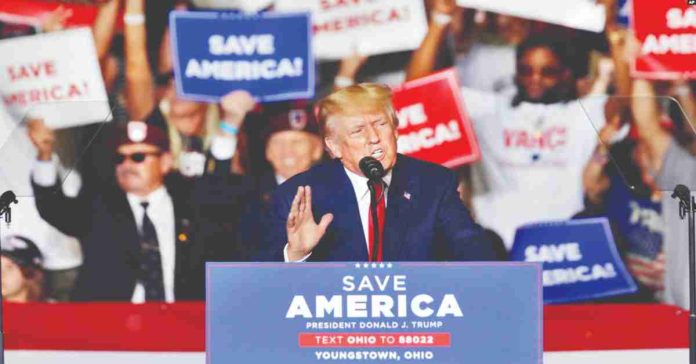By Kenneth Tiven in Washington
Candidates, campaigning, courts, conspiracies, claims, and counterclaims—it will sound and feel like an instant replay of the 2020 election. Only the candidates will have changed, and the arguments will be the same, with many of the same law firms and advocates who failed to convince 98% of the courts they entered last time that cheating existed. Or will it be that close? Perhaps pundits on both sides of America’s political and ethical divide will be wrong. One guarantee is that the former president, who has spent the past two years insisting he was “robbed,” will argue that his handpicked candidates in various races for US Senate were “robbed as well.” Recounts in close races could take weeks, but lawyers are paid by the hour in America.
Many Republican candidates have allied themselves with the “Big Lie” theory that former president Donald Trump’s 2020 re-election was stolen by a Democratic conspiracy to rig the voting. Any analysis of the Democratic coalition suggests their inability to agree on many issues makes such an effort impossible to believe.
What is plausible is this: Trump’s political operation has spent more money since he left office on lawyers representing the former president and a pair of nonprofits staffed by former cabinet members than it has on Republican congressional campaigns, according to a review of financial filings. Trump’s leadership PAC, “Save America”, has blitzed supporters with fundraising solicitations for Congress that, “It is IMPERATIVE that we win BIG in November.”
Trump has been campaigning, mostly speaking at length about his grievances with the political system that now has him bogged down in lawsuits and possible criminal charges for taking classified documents home after leaving the White House. He has raised millions of dollars from small donors through a barrage of emails. I receive three to five daily, many of them with outrageous claims. He has spent very little of this to help Republican candidates.
The single issue regarding how Americans will vote rests squarely on Trump’s shoulders for appointing three conservative members to the US Supreme Court. The ideological decision in a 6-3 vote to remove a national right to abortions has focused voters on the issue of democracy versus an authoritarian party that relishes regulation of personal behaviour while claiming to be against overt or excessive regulation.
The Supreme Court’s calendar for the new term includes several issues with intensely political implications. This Court’s affection for the Federalist Society’s interpretation of the Constitution places very little value on the long-time judicial approach of stare decisis, the relevance with past rulings which has worked to avoid abrupt ideological change. The public—the people whose lives the Court’s decisions control—don’t care for the rightward shift away from how they perceive the law and the Constitution should govern their lives.
The ruling on abortion highlights the intensity of this, especially for younger women, and even those older women who rarely vote, but have daughters. The anti-abortion people have been vociferous that the unborn child from the moment of conception has more rights than an adult woman. Through its own behaviour, the Court has become a crisis issue for a broad cross-section of the nation since six of the nine justices are perceived to be unaccountable super-legislators putting their personal feelings into the public sphere.
The world struggles to understand the motivation of Vladimir Putin’s Russia to go to war with Ukraine, a war which incidentally he appears to be losing. The death and unwarranted physical destruction are obvious there. In America, Trump’s takeover of the Republican Party has accelerated a war with many aspects of today’s America, including immigration, cultural diversity, the social safety net of the social security system and Medicare insurance programmes. Ronald Reagan’s idea of taxing the wealthy at a lower rate than what middle and low-income people pay is popular with the Trump fan base. Trump dictated that several manifestly unprepared people should run for the US Senate in states they don’t live in, which looks likely to backfire.
So, carefully digest what you read and hear about which political party will win Congressional control. It will be close, but unlikely to be the easy victory assumed six months ago by pundits and the Republican leadership.
In the age of the Internet, the ratio of propaganda to factual information would cause even author George Orwell to seek a quiet spot in the North of England, giving up writing about fascism versus democracy, as he did during and after World War-II. We shouldn’t be surprised by the anti-immigrant rhetoric because in the middle part of the 20th century an isolationist moment emerged in broad daylight to keep America out of foreign wars in Europe and refugees from Nazism out of America. The Japanese attack on Pearl Harbor broke that movement.
Today, pollsters have a difficult time getting people to talk honestly. Asking people about inflation rarely finds people who applaud the idea. After two-plus years of pandemic disruptions in the supply of money and goods to buy makes this a global problem. What is obvious is that all sorts of groups on both sides of the political divide are using email to raise funds. Many of these emails come from groups one does not recognize, but suggest a connection to raising money for a candidate. But perhaps not. A scam is just a scam.
—The writer has worked in senior positions at The Washington Post, NBC, ABC and CNN and also consults for several Indian channels.


